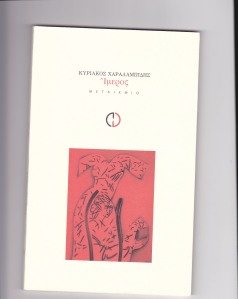Tags
"Αγαμέμνων", "Μυθιστόρημα", "Μωρή κοντούλα λεμονιά", "Ο γυρισμός του Ξενιτεμένου", "The Migrant's Return", Agamemnon, Clytemnestra, Fork, παραλογές, Αγαμέμνονας, Αισχύλος, Γιώργος Σεφέρης, Κυριάκος Χαραλαμπίδης, Κλυταιμνήστρα, Ορέστεια, Kyriakos Charalambides, Modern Greek literature of Cyprus, Modern Greek poetry in translation, The House of Atreus
 The poem is included in the collection Desire (Ίμερος, 2012). Υou can read the Greek original here.
The poem is included in the collection Desire (Ίμερος, 2012). Υou can read the Greek original here.
Apart from the first two verses, the poem, which engages in intertextual dialogue not only with Aeschylus, but also with the παραλογή of “The Migrant’s Return” (“Ο γυρισμός του ξενιτεμένου) is written in the style of the folk ballad. To echo that style in the English translation, I tried, as far as possible, to imitate the rhythm of the Greek 15-syllable iambic].
AGAMEMNON
“There is a sea — and who shall ever dry it up?”
AESCHYLUS, Agamemnon
Mouth of Clytemnestra kissing
the sleepless, purple carpet:
— The sea, the sea! And who shall ever dry it up completely?
— I will, her husband says, I’ll be the one to dry it.
— Give me some talk about the yard, oh ye, the mighty captain.
— Right in the mid there is a tree heavy with luscious lemons,
and if you tear their song apart, lemons again you’ll find.
— You are my man, she says to him, whom I’ll be keening over.


Pingback: Το Λωτοφαγικόν 2014! | Λωτοφάγοι
Pingback: “Aeschylus son of Euphorion’s valour”: a poem by K. Charalambides translated by A. K. Petrides | Λωτοφάγοι
Pingback: “Λωτοφάγοι”: Γενικό ευρετήριο | Λωτοφάγοι
Pingback: “Orestes”: a poem by Kyriakos Charalambides, translated by A.K. Petrides | Λωτοφάγοι
Pingback: “At his daughter’s wedding”: a poem by Kyriakos Charalambides translated by A.K. Petrides | Λωτοφάγοι
Pingback: “Ardana II”: a poem by Kyriakos Charalambides translated by A.K. Petrides | Λωτοφάγοι
Pingback: “Child with a photograph”: a poem by Kyriakos Charalambides translated by A.K. Petrides | Λωτοφάγοι
Pingback: Οι “Λωτοφάγοι” και η σύγχρονη λογοτεχνία (ελληνική και ξένη): μια καταγραφή | Λωτοφάγοι